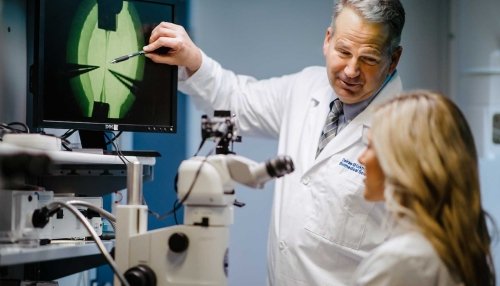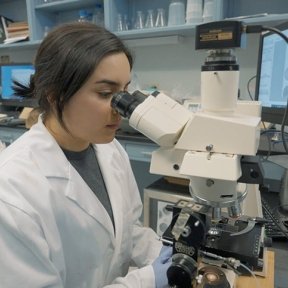Prepare for a dynamic career with our 21-month Master of Biomedical Sciences (M.B.S.) program. Strengthen your academic foundation and gain hands-on research experience to position yourself for professional school, roles in biotechnology and pharmaceutical laboratories, or careers in science communication and education.
Enhancing Your Academic Foundation
Dive deep into the biomedical sciences and bolster your academic foundation. Whether you're aiming for medical school, dental school, or other healthcare professions, our program equips you with the knowledge and skills needed to shine in your chosen path.
Broadening Your Career Horizons
The M.B.S. Program is your launchpad to diverse career opportunities. By emphasizing hands-on research projects alongside rigorous academics, our program builds advanced analytical skills on a strong scientific foundation. This empowers graduates to excel in demanding health professions programs, drive innovation in biotechnology and pharmaceutical research, and effectively communicate scientific knowledge.
Customized Curriculum
Our program is typically completed in 21-24 months and requires a minimum of 72 quarter hours. To ensure you're well-prepared for your future endeavors, you must finish the program within four years of matriculation, excluding approved leaves of absence. A central component of your journey is a research project approved by your research committee.
Research Excellence
Master the art of scientific research with courses that emphasize critical thinking, study design, data analysis, ethical research conduct, and effective communication. You'll also have opportunities to present your thesis research at scientific conferences, supported by available funding.
Kenneth A. Suarez Research Day (login required)
Faculty Guidance and Support
Our experienced faculty advisors-professors who lead active research labs within the program-are committed to mentoring you every step of the way. From refining your resume and personal statement to strengthening your interview and communication skills, they'll help you confidently chart your career path.
Scholarships and Financial Assistance
Most M.B.S. students receive funding through a variety of scholarships and financial aid programs. The MWU Scholarship, CGS Dean's Scholarship, and Federal Work Study programs make your graduate education more accessible.
For more information, visit the Scholarships and Financial Aid Types pages.
Admission Agreements with AZCOM & PA
If you are interested in a direct path to the Arizona College of Osteopathic Medicine (AZCOM) program, you can earn guaranteed admission while enrolled in the Biomedical Sciences program. Please review the requirements for direct matriculation in AZCOM, which would begin the fall after you graduate from Biomedical Sciences.
For students interested in the Physician Assistant (PA) program, qualified Biomedical Science students are guaranteed an interview with the PA program beginning with the class matriculating in the summer quarter of 2027. Please review the PA AZ - CGS requirements and PA IL - CGS requirements for details.
Learn More
Learn more about the requirements and find quick links to relevant catalog content to guide you in your application process.
To be considered for admission to the Master of Biomedical Sciences Program, an applicant must have:
- A bachelor's degree or higher from a regionally accredited college or university.
- A minimum cumulative GPA of 2.75 on a 4.00 scale.
- One letter of recommendation from a pre-health advisor or committee, science professor, or health professional.
- Copies of transcripts from each college or university attended. Official transcripts must be submitted prior to matriculation.
- Commitment to abide by the Midwestern University Drug-Free Workplace and Substance Abuse Policy.
- Passage of the Midwestern University criminal background check.
Test scores from one the following are optional: MCAT, PCAT, DAT, OAT, GRE.
*Subject to change
The Master of Biomedical Sciences Program uses a rolling admission process in which completed applications are reviewed and decisions are made at regular intervals during the admissions cycle. The Master of Biomedical Sciences Program begins in the fall quarter.
Class of 2024
100% (12/12) graduates were accepted to the following programs:
- 6 - Arizona College of Osteopathic Medicine (AZCOM)
- 3 - College of Dental Medicine-Arizona (CDMA)
- 2 - Arizona College of Podiatric Medicine (AZCPM)
- 1 - Physician Assistant (Other program)
80% (12/15) students graduated on-time without taking a leave of absence or extending the time to graduation.
- Female: 59%
- Male: 41%
- Average Age: 26
- Average Overall GPA: 2.97
- In-State: 38%
The Midwestern University Master of Biomedical Sciences Program educates and prepares students in the biomedical sciences to be competitive applicants for careers in a wide range of health-related fields, as well as for additional academic and professional training.
Biomedical Sciences students may also qualify for specialized articulation agreements with other Midwestern University programs. Please contact the Office of Admissions for specific information and deadlines regarding articulation agreements that are in place for the professional program(s) in which you might be interested.
*Subject to change
The State of Arizona Board of Private Postsecondary Education has approved all current degree programs at Midwestern University-Glendale, Arizona Campus. All degrees are conferred under the authority granted by the Arizona State Board for Private Postsecondary Education and The Higher Learning Commission, A Commission of the North Central Association of Colleges and Schools.
Midwestern University is accredited by The Higher Learning Commission/A Commission of the North Central Association of Colleges and Schools (HLC/NCA), 230 South LaSalle Street, Suite 7-500, Chicago, IL 60604-1413; 312-263-0456.
Academic Course Catalog
Explore details regarding your specific College/Program (subject to change).
The Midwestern Difference
Tailored to meet your needs, Midwestern University's one- and two-year Biomedical Sciences degree programs offer the options you need to achieve your goals. Our student-centered curriculum is designed to provide you with a broad background in the biomedical sciences. Caring faculty members will guide you as you develop the academic and analytic skills you need to build your future. You'll be well-prepared for success whether you decide to pursue additional education in the health professions or choose to start a meaningful career in biomedical science.
What You Can Do with a Biomedical Sciences Degree
From taking part in life-changing research studies to discovering new medical advancements, a degree in biomedical sciences empowers your success.
Hear Our Stories
Daniela Alcazar, M.B.S., Biomedical Sciences, Class of 2023
“It’s a very difficult program, but because of that, it will set me up for a medical professional career that I will feel very prepared for.”
Lori Buhlman, Ph.D., Professor, Biomedical Sciences
“We are hired to be teachers first and anything else that we do, whether it's research or clinical practice, is second. So we are hired for the students.”



